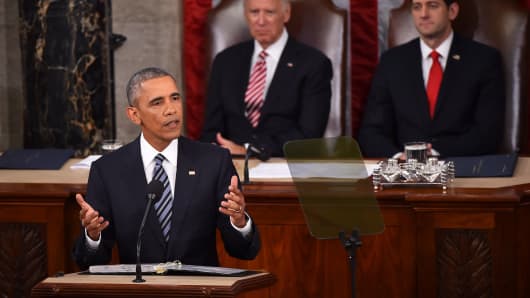President Barack Obama has promised a “moonshot” to cure cancer, but the biggest obstacle to that goal could be his major healthcare achievement – The Patient Care and Affordable Care Act.
Obama said in his final State of the Union speech that vice presidentJoe Biden will push researchers to cure cancer within five years. It’s a worthy ambition. The American Cancer Society estimates that 1.69 million Americans will be diagnosed with cancer in 2016 and 596,000 U.S. people will die of it. Only heart disease kills more Americans.
There is, however, no single, silver bullet that will cure cancer. Cancer encompasses more than 200 diseases that are best cured by innovative precision medicine strategies.
The good news is that last year Obama embraced personalized medicine with a $215 million initiative. In his 2015 State of the Union speech, Obama announced “a new precision medicine initiative” that promises a “new era of medicine, one that delivers the right treatment at the right time, every time, to the right person.”
Unfortunately, the Affordable Care Act works against advancing personalized medicine to cure cancer because it forces doctors to employ one-size-fits-all, “evidence-based” generic therapies. That approach promotes interventions that may only be effective for patients similar to those in research studies – and that is the exact opposite of personalized medicine.
Precision medicine methods, beyond cancer therapies, include measuring unique biomarkers, and monitoring trends within an individual over time, taking into account genetics, lifestyle, and family history. Treatment models that have developed under The Affordable Care Act encourage significantly fewer tests. For instance, women who want mammograms before the age of 50 might have to pay more than before because of updated guidelines.
And genetic testing is permitted only for rare cases. The result is that the wealthy get the tests and treatments they need while middle and lower class Americans might only get the most basic of tests, which will not reveal the dangers already lurking in their body or in their genetics.
The modern war on cancer began in 1971 with President Richard Nixon’s National Cancer Act. Scientists embarked on two paths. The first approach was to identify and kill cancers; the second path was to better understand cancer at the genetic and molecular level.
Advances in understanding cancer, prompted Andrew von Eschenbach, then the director of the National Cancer Institute, to pledge in 2003 to “eliminate suffering and death from cancer by 2015.” His bold promise would only be realized through personalized medicine, he said.
“Genomics, proteomics, and emerging technologies are enabling us to profile not only diseases but the persons who bear those diseases. We can thus understand the genetic and molecular differences so that we can begin to personalize intervention strategies,” von Eschenbach said in a 2005 speech to the Center for Medical Progress.
[“source -cncb”]




